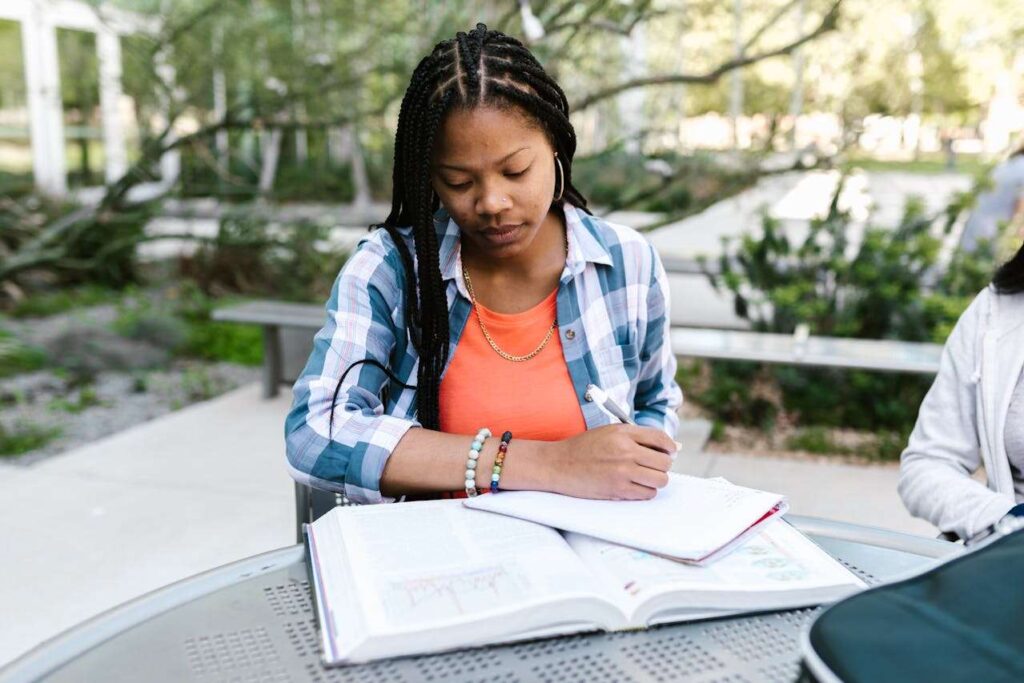I’ve been writing for the IB for a long time, so I’ve seen a lot of questions about academic honesty and plagiarism. One that often comes up is, “Can Turnitin detect essays I bought online?” Students may think about purchasing essays because of the stress of IB and the difficulty of finding enough time to do everything. However, they are often afraid of being caught.
Let me talk about what I know about Turnitin’s features from personal experience and why it’s essential to understand what it can find.
What Is Turnitin and How Does It Work?
IB schools and academic organizations worldwide rely heavily on Turnitin, a modern plagiarism detection tool. From what I’ve seen, Turnitin doesn’t just look for simple instances of plagiarism; it does a complete analysis by comparing an essay to a vast library of constantly updated sources. It includes school papers, online articles, and, most importantly, work that students have already turned in. But how does it get to this level of completeness and accuracy?
How Does Turnitin Work?
Turnitin has a very advanced method for looking for resemblances that can even find small amounts of stolen content. From what I’ve seen, this technology works by breaking the text sent into smaller pieces called “textual fingerprints.” Then, these parts are carefully checked against a vast database to see if any content matches.
Turnitin evaluates the originality of an essay in the following manner:
- Turnitin breaks each essay into small pieces, which allows it to find stolen sentences even if they’re spread out in the text.
- In addition to finding word-for-word matches, Turnitin’s algorithms can also find parts that have been copied or rephrased. It’s crucial in academic settings where original writing is required.
- The software compares the essay to a database of previously published works, academic papers, and web material to see any connections.
- When Turnitin gives you an originality score and a thorough report highlighting matching parts, it’s easy to see where citations are missing.
The same standards judge each student’s work, so every entry is treated equally, whether it’s the first time or a second time.
Does Turnitin Check Previously Submitted Work?
The fact that Turnitin can scan and compare new entries to old ones makes its detection system very good. Many students ask me, “Does Turnitin.com check other students work?” The simple answer is yes, and this is where Turnitin’s plagiarism detection skills shine.
Turnitin stores submitted essays in a database accessible worldwide. To detect similarities in new submissions versus any previously submitted work, Turnitin uses this repository, which contains innumerable papers from around the globe. Thus, plagiarism is detected when a student submits the same or substantially identical work many times.
What Can Turnitin Detect?
As an IB writer, I’ve seen how students often don’t realize how powerful Turnitin is and think it can only catch blatant plagiarism. However, Turnitin can find many content problems, from direct plagiarism to work that isn’t properly cited. Its complex algorithms protect academic honesty by ensuring that all entries meet strict requirements for originality.
Let’s look better at what Turnitin can find and why it’s essential for students who want to do honest, good work.

Curious about how to use questions in your writing? Read our latest guide for expert advice.
Direct Copying from Online Sources
Turnitin does a fantastic job of detecting direct plagiarism in academic papers on the Internet. It will highlight instances where a paper incorporates phrases or paragraphs that mimic online information. Any content downloaded straight from the Internet without proper citation is likely to be detected since this detection extends to publicly accessible articles, blogs, and open-access research.
Previously Submitted Student Papers
So, does Turnitin detect plagiarism from other students’ papers? The ability to compare current work with previously submitted works is a strong suit of Turnitin.
When an essay is submitted, it is checked against every paper ever submitted to Turnitin worldwide. This approach ensures that no student, regardless of school or year, may recycle an assignment from another.
Paraphrased Content and Poorly Rephrased Text
Finding identical matches isn’t Turnitin’s only limitation. Additionally, it can identify badly quoted information. Even with little changes to structure or phrasing, Turnitin’s algorithms can usually spot instances of plagiarism.
Therefore, students who attempt to escape plagiarism detection by rephrasing their sentences very little may still have their work marked as plagiarized.
Improperly Cited Sources
Add to Turnitin’s detection triggers improperly structured or missing citations. Turnitin does not assess citation style, but it does flag paragraphs that should have citations, which students may use to spot any citation difficulties. This feature promotes proper academic practice, ensuring students appropriately credit all external sources and ideas.
Self-Plagiarism
One of its less well-known features is that Turnitin can identify instances of self-plagiarism. The correct response for students pondering, “Will Turnitin detect my own work?” is yes.
Turnitin will detect a match if you utilize someone else’s work without giving proper credit. Therefore, it is essential to see each assignment as a chance to create new, unique material, as academic penalties might be imposed for self-plagiarism.
Can Turnitin Detect Bought Essays?
“Can Turnitin find bought essays?” is a question I often hear from IB students. It’s important to know what Turnitin can and cannot find in this complicated subject. Turnitin is very good at finding content that matches its large public and academic files, but it can’t figure out where an original, custom-written essay came from.
As long as the original essay hasn’t been published or turned in before, Turnitin can’t tell if you paid an IB Writing Service to do the work. So, this tool won’t mark a paper as duplicated or reused material if it is original and hasn’t been previously turned in or published.
When a student buys a custom-written essay, the author usually makes it from scratch based on the student’s instructions. This essay won’t appear in Turnitin’s database because it doesn’t match any other entries as long as the writer wrote something completely original. Custom-written essays don’t have any copied material that Turnitin is supposed to find, so they can’t be seen by its standard checks.
In real life, this is how Turnitin’s essay detection method works with custom-written essays:
- Unique content. The essay is written just for the student and has reasons, organization, and analysis that aren’t found anywhere else.
- Original research. Professional services often use their sources and research to ensure their work doesn’t duplicate anything already filed or found online.
- There are no matches in existing databases. The essay is brand new, so there will be no matches in Turnitin’s files or public databases.
So, Turnitin is still a great way to find content that has been copied or reused, but it can’t tell if a paper was bought as long as it is custom and unique. Students need to know this difference to deal with academic ethics.
Struggling to understand what a claim in essay writing is? Our comprehensive guide has all the answers you need to succeed.
Does Turnitin Detect ChatGPT?
As the rules for academic honesty change, a common question is whether plagiarism detection software can find content made by AI, like ChatGPT. Understanding what Turnitin can do in this situation is very important for students who want to use AI tools in their writing.
Turnitin, renowned for its effective plagiarism detection, focuses on content that has already been published or submitted. Because ChatGPT creates answers based on a huge collection of data it has learned from, these responses are unique and not directly copied from other sources. Because of this, Turnitin can’t directly tell the difference between text made by ChatGPT and text from other websites or academic papers.
But there are some details to think about:
- Originality of AI-generated content. ChatGPT can make original content that doesn’t copy whole texts from other sources, so Turnitin is less likely to flag it.
- Contextual alignment. You must carefully AI-created content to ensure it fits the assignment’s needs and context since it might not always perfectly match academic standards.
- Stylistic consistency. If the AI’s writing style is very different from a student’s usual work, that might make you suspicious, even if Turnitin’s standard detection algorithms don’t pick it up.
Even though evaluators don’t specifically use Turnitin to find text made by AI, students need to know how to use these tools properly. Using AI to help with your work should only improve the quality of your work and knowledge, not replace your analysis and critical thought.
Don’t let the stress of the IB curriculum hold you back.
Are you having trouble coming up with topic suggestions for your IB Extended Essay? Or do you need help with Internal Assessment?
Our experienced writers can help you choose the perfect topic and assist you with any assignment.
You can order an Extended Essay tailored to your specific subject and requirements.
Our experienced IB writers are always ready to help.
Simply click:

Conclusion
To sum up, Turnitin can find writings bought online if they match something already in its database. Detecting essays that use copied or paraphrased material or parts from online sources is especially difficult. However, evaluators will not find custom-written essays if you hire a good service.
But remember, Turnitin’s database expands constantly. If you choose an unreliable service, the work you purchase likely matches content already stored in Turnitin’s archives because the author has sold it to others.
Finally, I want to tell you to be honest when you do your IB tasks. It will help you stay safe from Turnitin detection and prepare for better grades and personal development. You can best be original, honest, and understanding in the IB program.

